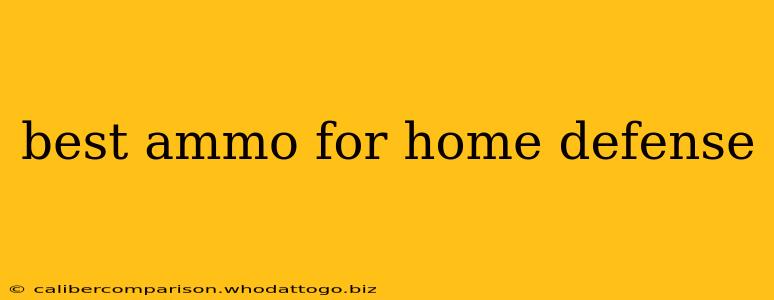Choosing the right ammunition for home defense is a critical decision, demanding careful consideration of various factors beyond simple stopping power. This isn't a decision to be taken lightly; the consequences of a wrong choice can be severe. This guide aims to provide a comprehensive overview, helping you make an informed decision based on facts and expert recommendations. Remember, local laws and regulations regarding ammunition vary, so always check your state and local ordinances before purchasing.
Key Considerations When Choosing Home Defense Ammo
Several factors must be weighed when selecting ammunition for home defense. Ignoring any of these could compromise your safety and effectiveness in a critical situation.
1. Caliber and Stopping Power
The caliber (diameter of the bullet) is often the first consideration. Popular choices include 9mm, .40 S&W, .45 ACP, and 12 gauge shotguns. Larger calibers generally deliver more stopping power, but this isn't the sole determinant. Stopping power involves a complex interplay of factors, including bullet expansion, penetration, and energy transfer.
-
9mm: Offers a good balance between capacity (more rounds in a magazine), manageable recoil, and stopping power. Modern 9mm ammunition with expanding bullets excels at delivering energy to the target.
-
.40 S&W: Provides greater stopping power than 9mm, but with increased recoil. This can lead to reduced accuracy, especially under stress.
-
.45 ACP: Known for its substantial stopping power, but with significant recoil and lower capacity magazines compared to 9mm.
-
12 Gauge Shotgun: Delivers devastating stopping power, particularly with buckshot, but has substantial recoil and a limited capacity. The spread pattern of buckshot needs consideration for over-penetration risk within a home environment.
2. Bullet Type: Expanding vs. Full Metal Jacket (FMJ)
The bullet's design plays a critical role in its effectiveness.
-
Expanding Bullets (Hollow Point, Jacketed Hollow Point): Designed to expand upon impact, transferring more energy to the target and reducing penetration. This is generally preferred for home defense to minimize the risk of over-penetration.
-
Full Metal Jacket (FMJ): These bullets are designed for penetration and don't expand on impact. While they can be effective, their higher penetration risk makes them less suitable for home defense due to the potential for unintended harm to innocent bystanders or those beyond the target.
3. Over-Penetration: A Crucial Safety Concern
Over-penetration is the most significant risk when choosing home defense ammunition. A bullet passing through the intended target and continuing to travel into adjoining rooms or even outside poses a serious danger. Expanding bullets designed for controlled expansion minimize this risk.
4. Recoil Management: Practice is Key
The recoil (the backward force of the firearm upon firing) significantly impacts accuracy, especially in stressful situations. Choosing ammunition with manageable recoil for your specific firearm is essential. Extensive practice is crucial to develop proficiency and reliable accuracy with your chosen ammunition and firearm.
Recommended Ammunition Types for Home Defense
While specific recommendations depend on your firearm and personal preferences, certain ammunition types consistently prove effective and relatively safe for home defense.
-
9mm: Expanding ammunition from reputable manufacturers such as Federal HST, Speer Gold Dot, or Hornady Critical Duty. These rounds are designed for controlled expansion and reliable performance.
-
.40 S&W: Similar expanding ammunition brands as above are suitable, but recoil management is paramount.
-
.45 ACP: Expanding ammunition is crucial to manage over-penetration, though the increased recoil requires more practice.
-
12 Gauge Shotgun: 00 Buckshot is a popular choice, but the spread pattern must be carefully considered for over-penetration within a home. Reduced recoil ammunition is available for those with concerns about recoil.
Conclusion: Choose Wisely, Practice Regularly
Selecting home defense ammunition requires careful deliberation. Balancing stopping power with the crucial need to minimize over-penetration is paramount. Thorough research, considering the factors detailed above, and consulting with knowledgeable firearms experts will help you make the best choice for your situation. Remember that regular practice with your chosen firearm and ammunition is vital to ensuring accuracy and preparedness in a critical situation. Your safety and the safety of others depend on it.

